- Home
- Richard Dawkins
Brief Candle in the Dark Page 3
Brief Candle in the Dark Read online
Page 3
‘Suppose you were the world authority on the topic of your favourite question,’ I suggested. ‘You couldn’t write down more than a small fraction of what you knew.’ With a nod to Ernest Hemingway I advocated ‘iceberging’. Nine-tenths of an iceberg is submerged. If you are the world authority on a topic, you could write about it till kingdom come. But you’ve only got one hour, like everybody else. So, cunningly exhibit the tip of your iceberg and let the examiner infer the huge quantity that lies beneath the surface. Say, ‘Notwithstanding Brown and McAlister’s objection . . .’ and convey to the examiner that you could, if you had time, go to town on Brown and McAlister. Do not actually do so because that would take too long and leave you no time for all the other iceberg summits that you need to skip on to. Just the name-drop does the business: the examiner will fill in the rest.
It’s important to add that iceberging works only because we assume that the examiner knows a lot. Iceberging is a terrible technique in, say, instruction manuals where the author knows what is being imparted but the reader does not. Steven Pinker makes the point forcibly as the ‘curse of knowledge’ in his splendid book The Sense of Style. When you are actually trying to explain something to somebody who knows less than you do, iceberging is the exact opposite of what you should be doing. It works in exams solely because it is fair to presume that your reader is an examiner who knows a lot.
When I was an undergraduate myself, the wise and learned Harold Pusey took me and a group of contemporaries for similar coaching, and iceberging was one of the tips he gave us. I think his metaphor was not actually icebergs but shop windows, and it works just as well. An impressive shop window is sparsely furnished. A few tasteful items, elegantly presented, evoke the riches stashed away inside the store. A good window-dresser doesn’t clutter the window with everything in the shop.
Another of Mr Pusey’s tips (yes, Mr: he was a don of the old school who never bothered with a doctorate), which I passed on verbatim to my own students, was this. When you’ve read the exam paper and spotted a favourite topic, don’t immediately start writing that essay. First, decide which three of the twelve questions you are going to tackle; then make a written plan for all three essays, each on a separate sheet, before you start writing any one of them. While you are writing your first essay, you will find that ideas for the other two continually occur to your primed mind. When that happens, jot down a note on the appropriate one of your three sheets of paper. Then, when you come to answer your second and third questions, you’ll find that much of the thinking work has already been done, at almost no cost in time. I’m told that this tip is also pertinent to American students taking the Advance Placement exam.
I didn’t have the courage to pass on another of Harold’s pieces of advice: stop revising a whole week before your final exams start; spend the last week punting on the river and let it all sink in. I did, though, tell them yet another piece of his wisdom: during your weeks of Oxford finals, you will probably have more concentrated knowledge in your head than at any other time in your life. Your task while revising is to systematize it while it simmers: seek connections and relationships between different parts of your knowledge base.
During my years in the Zoology Department, I also took my turn as examiner from time to time, and a very heavy responsibility it is. Quite apart from the hard work involved, you cannot escape the grave knowledge that your decisions are going to affect the whole future lives of promising and eager young people. Some unfairnesses are built into the system. The students end up classified into one of three discrete classes, although everybody knows that the bottom of one class is much closer to the top of the class below than it is to the top of its own class. I wrote about this in ‘The tyranny of the discontinuous mind’ (in New Statesman when I was guest editor; see e-appendix) and I won’t spell the argument out again here.
But there are other unfairnesses that an examiner can, and should, do something about. How sure can you be that the order in which you read the scripts is unimportant? Are you getting fatigued as you read paper after paper? Is your standard of judgement drifting – either upwards or downwards – as a result? Or, if not physically fatigued, are you getting progressively bored by the inevitable familiarity as answer after answer to the same popular question thuds into your consciousness? Does this give an unfair advantage to candidates who choose unpopular questions? Is that advantage unfair? Does the ‘boredom or fatigue effect’ give an unfair advantage to those essays that you read early? Or to those that you read late? I tried to guard against ‘order effects’ by using some of the elementary principles that all biologists learn in designing experiments. Don’t read all three of the first candidate’s essays, then all three of the second, and so on. Instead, read everybody’s first essay, then everybody’s second essay, then everybody’s third essay. And on each of your three runs through the scripts, it might be no bad thing to read them in random order, not the same order every time.
Then again, are you seduced by the elegant handwriting of this candidate, and prejudiced against the untidy scrawl of that one: a virtue or fault that has no bearing on the quality of scholarship – or does it? My first wife, Marian, and I were both examiners at various times during our careers in the Oxford Zoology Department, and we tried the experiment of reading the essays aloud to each other. That should have gone some way towards eliminating the ‘handwriting effect’, and it had additional advantages. At the end of a reading, without comment to each other, we would simultaneously on a count of three (so as not to influence each other) sing out the mark that each of us thought the essay deserved. We were both reassured by the high concordance between our separate marks. All Oxford papers are, in any case, double-marked – marked by two separate readers without collusion – which is a good attempt at safeguarding against certain types of unfairness. Also, nowadays (this didn’t happen when I was an examiner) the candidates’ names are disguised and they are known only by randomized numbers. This guards against personal biases either for or against, and it matters in a small department like Zoology, where most of the students are known personally to the examiners.
I had occasion to worry about order effects in other decision-making tasks, for example when I was on committees to choose new lecturers or fellows, or in judging prizes or awards. The Royal Society awards an annual Michael Faraday Prize for success in promoting science to the general public. I won it in 1990, and was later put on the committee to choose the prizewinner. The committee has a rolling membership, and I served as chairman for the last three of my five years. In the first two years, with my predecessor as chairman, I was worried about order effects. Each candidate had a dossier consisting of curriculum vitae and letters of support. We had all read the dossiers conscientiously before the meeting. So far so good. But then in committee we discussed all of them in order – probably alphabetical order, which makes it worse, but that’s not the point I am making here. Whatever ordering principle you choose, order effects are inevitable. It was distinctly noticeable that the first few dossiers were given lengthy discussion, and the length of discussion tailed off as the afternoon wore on. This was especially unfortunate when we would spend a lot of time near the beginning discussing the minute details of a candidate who turned out to be a no-hoper, with no support from any member of the committee.
When I became chairman, I changed the system in a way that I recommend for all such committees, and therefore think is worth explaining fully here. Before the committee began any discussion at all, each one of us, having read the dossiers before we arrived, wrote secretly on a piece of paper the names of the three candidates whom we would wish to discuss first, along with a score: three points for our top candidate, two marks for the next, one mark for the third. I then gathered all the slips of paper, added up the points, and announced the rank order. I had clearly explained to the committee that this was not a ballot to determine the prizewinner; it was a ballot solely to determine the order in which we would discuss the candidates. We t
hen discussed the dossiers properly and in detail, but the order in which we did so was not alphabetical, not reverse alphabetical (which is sometimes used in a vain but futile attempt to counter the known advantage the As and Cs have over the Ts and Ws), not arbitrary at all, but determined by our preliminary secret ballot. After our full discussion, we then proceeded to our final secret ballot rounds to choose the winner. The eventual winner might turn out to be the same candidate who had topped the preliminary ‘order’ ballot, but it might not: the exhaustive discussion during the afternoon could well change people’s minds. Under the old system, the lion’s share of the discussion time was squandered on candidates who never had any hope anyway. The new system meant that we had time to discuss more thoroughly those who did have at least some support, and to discuss them in a just order.
Sub-Warden
To serve on the committees that chose new lecturers and fellows was one of the serious responsibilities of my life at Oxford. There were others – financial, pastoral, custodial. A fellowship at a typical Oxford or Cambridge college brings with it trusteeship of a large charitable institution, making investments and disbursements that, in the case of a relatively wealthy foundation like New College, could be quite substantial. In addition, the fellows were as a group responsible for student welfare and discipline, for the upkeep of the chapel and other precious medieval buildings, and for much else besides. We elected officers from among our number to oversee each of the main functions. I was happily and rightly never elected to any office (I would have been hopelessly bad). However, there is one office no fellow of New College can escape: Sub-Warden. Other Oxbridge colleges may elect a Vice-Warden (Vice-Master, Vice-Principal, Vice-Provost etc., depending on the bewilderingly variable names that Oxford colleges choose for their heads), a colleague whom all respect to deputize for the head of the college. That isn’t New College’s way. We don’t elect our Sub-Warden: it is a one-year burden which descends inexorably down the list of fellows, and respect doesn’t come into it. Every year until the black spot hit me in 1989, I was able to count off the years of its approach. That count was always a maximum figure: a year was ominously knocked off it every time a colleague ahead of me in the list died or – which was pretty common – left to take a professorship elsewhere. ‘Ominously’, because I dreaded it.
The onerous nature of the Sub-Warden’s duties is justified by their brevity: only one year out of your life. As Sub-Warden I had to attend all committee meetings, and that meant all subcommittees and all appointing and electing committees as well as the full college meetings where I had to write the minutes. As it turned out, I quite enjoyed my minutes, using them as a vehicle to try to amuse my colleagues – those who read them, which was by no means all, as we sometimes discovered during the subsequent meeting. The Sub-Warden has to take the chair when the Warden is unavoidably absent from college meetings, or when the Warden has to recuse himself from a discussion that concerns him personally. The role is a particularly weighty responsibility when the college is electing a new Warden, for the Sub-Warden of the day has to preside over the whole voting procedure. Thank goodness this didn’t happen on my watch. In all the four wardenship elections in which I participated, the Sub-Warden of the day either happened to be well qualified or rose to the occasion. In one case some smart footwork ensured that the year of office of a notoriously unstable, not to say downright misanthropic fellow was somehow postponed in favour of a respected ‘safe pair of hands’. Incidentally, my lack of skill as a political operator is indicated by the fact that in three of those four elections I nominated the runner-up.
As Sub-Warden I had to preside over dinner in Hall, and say grace before (‘Benedictus benedicat’) and after (‘Benedicto benedicatur’). I was one of the majority who pronounced this last word ‘benedicahta’; some of the older, classically trained fellows pronounced it ‘bene-dye-cay-tour’, which fascinated me although I never dared follow them. I doubt that they really thought that’s how the Romans pronounced it, but their justification was surely thought-out and deliberate, probably buried in some erstwhile dispute among the dominies. One of my predecessors as Sub-Warden, the ancient historian Geoffrey de Ste Croix, used to refuse to say grace on conscientious grounds (he described himself as ‘an atheist, politely militant’). Equally conscientiously, however, he went out of his way to line somebody up to say it for him. Once when I was a dinner guest at King’s, our sister college at Cambridge (whose chapel, incidentally, is one of the most beautiful buildings in England), the senior fellow presiding was the incomparable Sydney Brenner, one of the founding fathers of molecular genetics and winner of a well-deserved (they aren’t always) Nobel Prize. Sydney gavelled everybody to stand, then solemnly intoned to his neighbour: ‘Doctor —, will you please say grace?’ I, however, was of the school of thought of the great philosopher Sir Alfred Ayer who, when Sub-Warden of New College, cheerfully said grace on the grounds that ‘I will not utter falsehoods but I have no objection to making meaningless statements.’
I was once fiercely attacked for adopting the same stance by Rabbi Julia Neuberger, one of Britain’s best-known rabbis and a well-established member of the ‘great and good’, both a dame and a member of the House of Lords. She sat next to me at a rather formal luncheon and furiously accused me of hypocrisy when she dragged out of me that I was prepared to say grace when presiding in New College Hall. I countered that although it meant a lot to her it meant nothing to me, so why should I object? It seemed to me a matter of simple courtesy, like removing your shoes when entering a Hindu or a Buddhist temple. Wasn’t I right simply to honour an ancient tradition? (Although actually I’m not sure that ‘Benedictus benedicat’ is all that ancient; does it, perhaps, like so many ‘ancient’ traditions, go back no further than the nineteenth century?) Once, at the beginning of a dinner in Wellington College after a debate with, among others, the Bishop of Oxford, the philosopher A. C. Grayling and the journalist Charles Moore (who for some reason brought a brace of shotguns to the occasion), the Master, the justly celebrated Anthony Seldon, jovially invited me to say a secular grace. Put on the spot, I couldn’t think fast enough to do any better than, ‘For what we are about to receive, thank the cook.’
Most daunting of the Sub-Warden’s duties was making speeches, usually for the purpose of welcoming new fellows or saying farewell to departing ones. It was the speeches that I especially dreaded as my year of tribulation approached, having heard some pretty poor Sub-Warden turns along with some good ones. As it turned out I could do it, although not off the cuff: I had to spend lots of time preparing my speeches in advance, and in this I was greatly helped by the more spontaneously witty Helena Cronin, philosopher and historian of science at the London School of Economics, who was my close collaborator at the time – we were helping each other to write our respective books, as I shall explain later.
Making speeches about new fellows is difficult because it’s in the nature of their newness that one doesn’t know them and has to rely for material on their written curricula vitae. The CV of a new law fellow, Suzanne Gibson, for example, announced a professional interest in ‘the body’ as a ‘visual and narrative structure’. I had a bit of fun with that, hamming up the role of a hypothetical future barrister trained in law at New College:
M’lud, m’learned friend has presented evidence that my client was seen burying a body at dead of night. But, ladies and gentlemen of the jury, I put it to you that a body is a visual and narrative structure. You cannot convict a man on evidence of burying nothing more than a visual and narrative structure.
Suzy was a good sport who took it well, and we later became close friends. Another new fellow whom I had to introduce that evening was Wes Williams, a scholar of French who became a valued colleague. We already had two other Williamses, so I was able to make something of this:
For years we had only a single Williams on the fellowship. We soldiered on but it didn’t look good, and I’m afraid it was a long time before we managed to get a
second Williams. I am therefore delighted this evening to welcome our third Williams, and I can officially announce that all future election committees will include at least one token Williams to see fair play.
These welcoming speeches always take place at ‘dessert’. The quaint ceremony of formal dessert, a version of which is observed in most Oxbridge colleges and which I never liked, takes place in a separate room after dinner, where port and claret, sauternes and hock, have to pass clockwise around the circle, and nuts, fruit and chocolates are handed round by the most junior fellows. New College has a curious contraption called the port railway, dating, as you might expect, from the nineteenth century, which is supposed to (and occasionally does) convey bottles and decanters by a pulley system across the gap in the circle which is the fireplace. Snuff also is traditionally handed round, but seldom actually taken (at least since the days of one venerable and long-retired fellow whose consequent prodigious sneezes would reverberate companionably around the oak panelling for the rest of the evening).
Although the Sub-Warden doesn’t have to seat fellows and their guests (as the presiding fellow does in some other colleges), he is expected to beam the role of genial host at dessert. I did my best, but there was one awkward evening. As I was helping people to find their seats I became aware, from a sort of ominous rumbling, that all was not well. Sir Michael Dummett, immensely distinguished philosopher, Wykeham Professor of Logic in succession to Freddie Ayer, stickler for grammar, conscientious and passionate campaigner against racism, world authority on card games and voting theory, was also famously choleric. When angered he would go even more than usually white, which somehow seemed – though this may be my fevered imagination – to make his eyes glow a menacing red. Pretty terrifying . . . and it was my duty as Sub-Warden to try to sort out whatever this problem was.

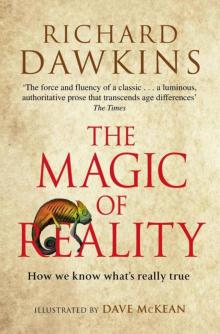 The Magic of Reality
The Magic of Reality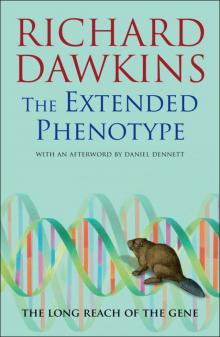 The Extended Phenotype
The Extended Phenotype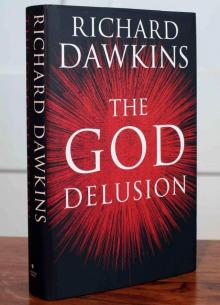 The God Delusion
The God Delusion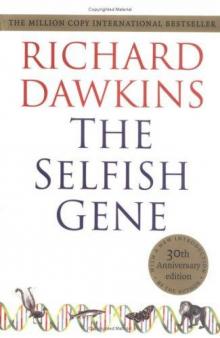 The Selfish Gene
The Selfish Gene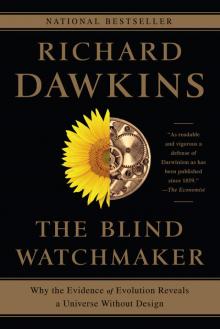 The Blind Watchmaker
The Blind Watchmaker The Greatest Show on Earth
The Greatest Show on Earth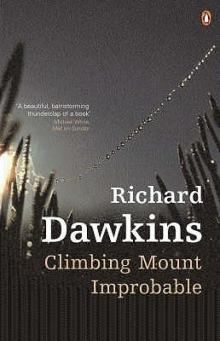 Climbing Mount Improbable
Climbing Mount Improbable Outgrowing God
Outgrowing God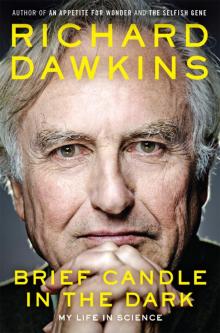 Brief Candle in the Dark
Brief Candle in the Dark The Greatest Show on Earth: The Evidence for Evolution
The Greatest Show on Earth: The Evidence for Evolution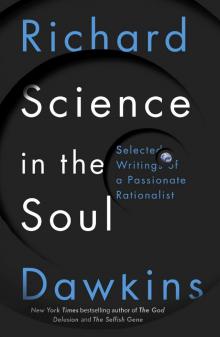 Science in the Soul
Science in the Soul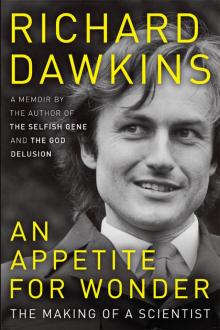 An Appetite for Wonder
An Appetite for Wonder